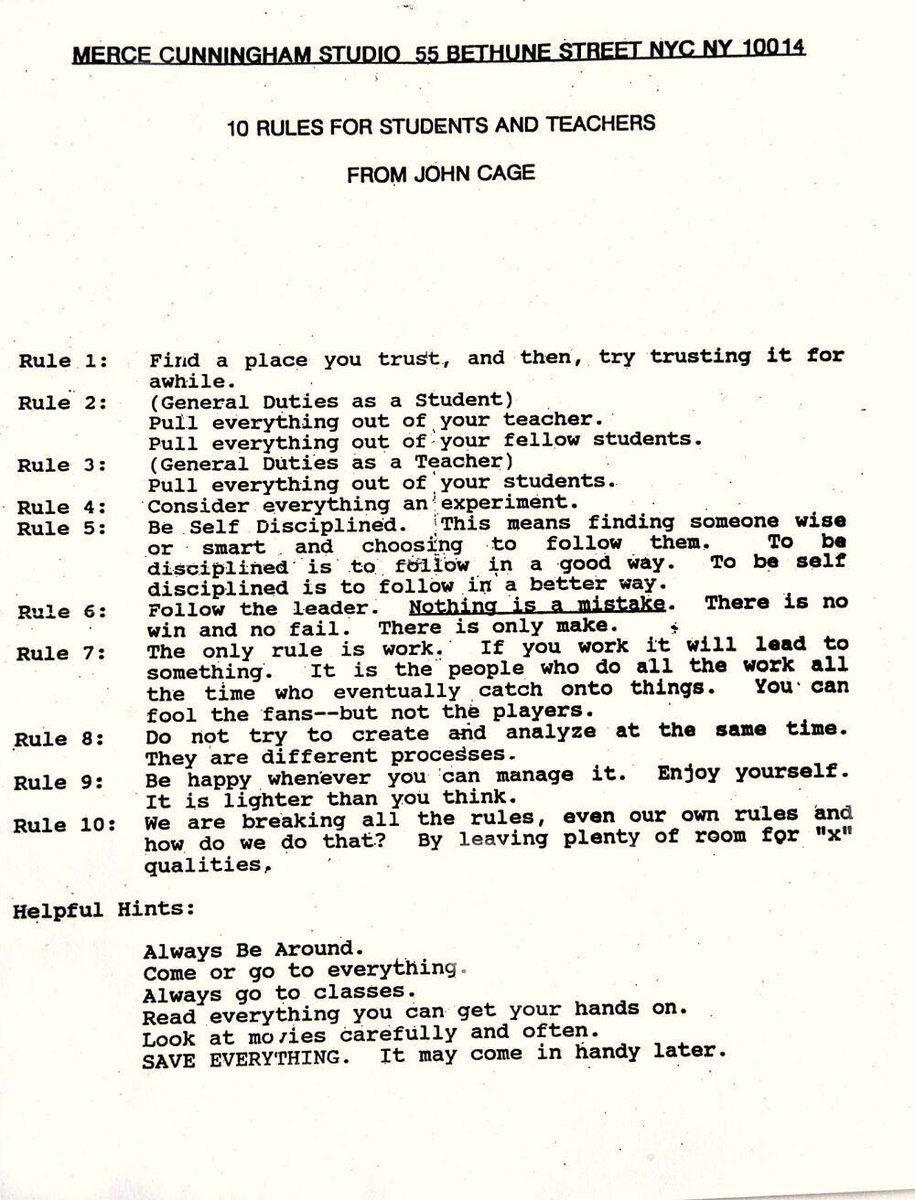
The Brian Eno archive More Dark than Shark recently posted on its Twitter account a list of twelve rules for students and teachers used by John Cage. Though much has been written about the artistic affinities between Eno and Cage, both of whose compositions have pushed the boundaries of how we think about music itself, they also both have a deep connection to the idea of using rules to enhance the experience of creation. Where Eno has his deck of creative process-enhancing Oblique Strategies cards, Cage had this list of rules first composed by an educator, silkscreen artist, and nun named Sister Corita Kent.
Kent came up with the list, writes Brainpickings’ Maria Popova, “as part of a project for a class she taught in 1967–1968. It was subsequently appropriated as the official art department rules at the college of LA’s Immaculate Heart Convent, her alma mater, but was commonly popularized by Cage, whom the tenth rule cites directly.”
That tenth rule, more of a meta-rule, reminds the reader that “we’re breaking all the rules” by “leaving plenty of room for X quantities.” But one can easily imagine how the previous nine, having as much to do with the enjoyment of the work of learning, teaching, and creating as with its rigorous performance, might appeal to Cage as well. The complete list runs as follows:
RULE ONE: Find a place you trust, and then try trusting it for a while.
RULE TWO: General duties of a student: Pull everything out of your teacher; pull everything out of your fellow students.
RULE THREE: General duties of a teacher: Pull everything out of your students.
RULE FOUR: Consider everything an experiment.
RULE FIVE: Be self-disciplined: this means finding someone wise or smart and choosing to follow them. To be disciplined is to follow in a good way. To be self-disciplined is to follow in a better way.
RULE SIX: Nothing is a mistake. There’s no win and no fail, there’s only make.
RULE SEVEN: The only rule is work. If you work it will lead to something. It’s the people who do all of the work all of the time who eventually catch on to things.
RULE EIGHT: Don’t try to create and analyze at the same time. They’re different processes.
RULE NINE: Be happy whenever you can manage it. Enjoy yourself. It’s lighter than you think.
RULE TEN: We’re breaking all the rules. Even our own rules. And how do we do that? By leaving plenty of room for X quantities.
HINTS: Always be around. Come or go to everything. Always go to classes. Read anything you can get your hands on. Look at movies carefully, often. Save everything. It might come in handy later.
Some of the rules on Kent’s list, which has now exerted its influence for half a century, sound faintly like the Oblique Strategies Eno and the painter Peter Schmidt would come up with in the 1970s. Take rule number six, “Nothing is a mistake,” which brings to mind the Oblique Strategy “Honor thy error as a hidden intention.” But we’re all on the same field when it comes to techniques to move our minds in worthwhile new directions, as Cage, Kent, Eno, Schmidt, and most other serious students, teachers, and creators might agree. They’d certainly agree that, all rules aside, everything ultimately comes down to doing the work itself, day in and day out. “Craft,” as Eno once said,” is what enables you to be successful when you’re not inspired.”
Related Content:
An Impressive Audio Archive of John Cage Lectures & Interviews: Hear Recordings from 1963–1991
How to Get Started: John Cage’s Approach to Starting the Difficult Creative Process
Jump Start Your Creative Process with Brian Eno’s “Oblique Strategies” Deck of Cards (1975)
Based in Seoul, Colin Marshall writes and broadcasts on cities and culture. His projects include the book The Stateless City: a Walk through 21st-Century Los Angeles and the video series The City in Cinema. Follow him on Twitter at @colinmarshall or on Facebook.


Wonderful message, thank you. I will share it with my bright finance students where these rules are very appropriate.
They can hardly hurt them. Unfortunately.
The first rule, find a place you can trust is the most important one to me. At this point in my life I am just trying to find a place I trust even in my own mind and body. So, to sit in a space for a while, and trust that I’m safe will lower my affective filter and allow creativity to flow much easier.